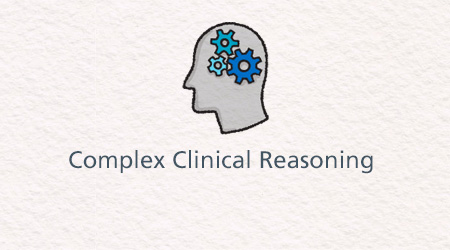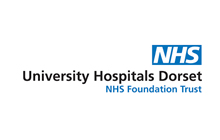Available on the Learning Hub
This programme is available on the NHS Learning Hub. We recommend you read the information on this webpage to find out more about the programme before you access the learning (https://learninghub.nhs.uk/catalogue/Complex-Clinical-Reasoning).
More information about the Learning Hub and the migration of elfh programmes can be found here.
About the programme
The Complex Clinical Reasoning elearning programme has been designed for clinicians working along the continuum of enhanced to advanced practice, who want to learn about the complexities of clinical reasoning.
Advanced practice is a level of practice in which a practitioner has demonstrated their ability to work autonomously at a high level across the capabilities of the four pillars of advanced practice noted in Health Education England’s (2017) Multi-Professional framework for advanced clinical practice in England.
Enhanced practice is the preceding level of practice healthcare professionals can attain before advanced practice and is used to describe the practice of highly experienced, knowledgeable healthcare professionals who make complex decisions using specific knowledge and skills in a field of expertise, managing discrete aspects of a patient’s care within their current level of practice, which will be particular to a specific context.
This programme is designed to work in parallel with supervision in practice for developing clinical reasoning skills in both the elearning and clinically based components of the programme’s learning. The clinically based component requires a supervisor to support clinical reasoning within the context and environment of the learner’s clinical practice. The elearning sessions aim to provide a supportive educational environment which can be followed up in practice. The sessions are not meant to be exhaustive.
One of the challenges of delivering this is how varied clinical roles and environments are from diverse professions such as AHPs, nurses and pharmacists who not only have very different roles but also clinical contexts and educational histories. Writing the programme this way allows the educational content to be introduced by elearning and shaped by practice.
There is a supervisor pack, and all the 9 elearning sessions should be completed under supervision in any order or timeframe. Details of each below:
-
The supervisor pack
You can download the supervisor pack here
-
1: Principles of clinical reasoning
This session introduces the learning process and is an opportunity for you as a supervisor to present learning opportunities to the supervisee. This may create a space to collaborate with the supervisee and negotiate a learning programme that suits both parties.
-
2: Exploration of the normative and narrative accounts
This session divides the clinical reasoning process into normative and narrative aspects of clinical decision making to facilitate two differing perspectives that can influence the clinical reasoning process. There may be tensions between these areas and at the same time an ever changing and evolving context that needs to be considered when taking the next step.
-
3: Adding layers of complexity – adding social and historical contexts
This session describes aspects of the history of clinical reasoning in healthcare from an agent-host model through to the bio-psychosocial and biocultural models. Not only has clinical reasoning had to evolve with a greater understanding and development of the natural sciences it has also had to respond to, and acknowledge, the societal and cultural changes that have unfolded alongside it. This is particularly relevant when considering the current challenges of longer-term conditions and associated co-morbidities.
-
4: Clinical decision making – the theory into practice
This session describes some of the many models of clinical reasoning that are used in practice including a shift toward personalised care that acknowledge the co-constructed and shared understanding of the human predicament.
-
5: Balancing the analytical process
This session uses a case study of a person with back pain to explore the analytical, emotive and intuitive aspects of clinical reasoning. This highlights how clinical reasoning is not simply a matter of adding things up and considering the weight of the presenting evidence, it also includes aspects of gut feeling and emotions drawn from previous experiences, current events, and anticipations of the future.
-
6: Multi-professional clinical reasoning
This session recognises different forms of clinical reasoning and the various approaches that are applied from different professional perspectives. It attempts to provide a consolidated model taking into account the clinical reasoning theories, strategies and frameworks that are centred around the person that we are caring for.
-
7: Movements in clinical reasoning – from evidence based medicine to clinical mindlines
This session describes and contrasts two distinct, but related accounts of how evidence in clinical practice should be considered and evaluated. This starts with evidence-based medicine as the starting point in the early 1990’s through to a modern version of evidence-based medicine or healthcare. The concept of clinical mindlines is introduced and discussed with the aim of encouraging the participant of this session to reflect upon the nature of knowledge and how it is used in clinical practice.
-
8: Philosophical considerations in clinical reasoning
Clinicians will often have to judge many different, and often contentious, forms of information in order to reach a decision. The nature of this information does not exist in a vacuum and will come from a particular perspective. This is where philosophy can shed light on the implicit and taken for granted assumptions that we all have when using evidence in order to make clinical decisions. It is hoped that this session will provide a platform for clinicians to consider this and allow a space for future reflective practice.
-
9: Ethical considerations in clinical reasoning
All clinical decisions require an ethical standpoint. This session explores and describes different ethical perspectives spanning general ethical considerations to particular cases. It is hoped that this session will draw the attention of clinicians to this important area of healthcare practice.
Evidence for Portfolios
After the learner has completed all of the elearning sessions and discussed the various topics encountered throughout the programme, it is recommended for the learner to undergo a final observed clinical practice. This is followed by a discussion with the supervisor and then by completing a reflective account or essay. The reflective account or essay can be used as evidence on the learner’s portfolio of evidence for progression along the continuum of enhanced to advanced to consultant levels of practice.
Once the learner has completed the sessions, they can request a Certificate of Completion to be given by their supervisor as evidence of achievement.
Primary and secondary audiences
Primary audience – Allied Health Professionals, Nurses, Pharmacists
Secondary audience – Other registered healthcare professionals, such as doctors, dentists, clinical scientists, and practitioner psychologists
Meet the team

Matthew Low
Consultant Physiotherapist University Hospitals Dorset NHS Foundation Trust Visiting Associate Orthopaedic Research Institute Bournemouth University
Dr Tim Noblet
Consultant Physiotherapist St George’s University Hospitals NHS Foundation Trust, Associate Professor St George’s University of London, Adjunct Fellow Macqarie University Sydney
Julia Taylor
Associate Post Graduate Dean GP Training Programme Director (LLR) GP Training Programme Director (Foundation) NHS England – East Midlands
Amanda Hensman-Crook
HEE National AHP Primary care Clinical Lead and MSK Subject Matter Expert, Consultant MSK Physiotherapist, Visiting Lecturer University of Winchester, Fellow of the Chartered Society of Physiotherapy
Charlotte Devereaux
Programme Manager, HEE elearning for healthcare
Moz Cammack
Project Manager, HEE elearning for healthcare
Steve Gibbons
Learning Designer, HEE elearning for healthcare
Tracy Watkins
Learning Designer, HEE elearning for healthcare
Rashmi Chavda
Graphic Designer, HEE elearning for healthcare
Louise Garrahan
Senior Marketing and Communications Officer, HEE elearning for healthcare
More information
Contributing authors
Dr Neil Langridge
Dr Samantha Copeland
Aimee Robson
Dr Emma Hyde
Dr Oliver Thompson
Julia Taylor
Jodie Smith
External Contributors
Manchester Metropolitan University
How to access
To access this elfh programme, you will require a Learning Hub account. If you do not have one, then you can register by selecting the Register button below. Note that if you hold a full elfh account, you can sign into the Learning Hub using your existing login credentials.
To view the Complex Clinical Reasoning programme, select the View button below. If you already have a Learning Hub account, you will also be able to login and access the resources within the programme.
Not an NHS organisation?
If you are not an NHS health or care organisation and therefore do not qualify for free access to the Learning Hub, you may be able to access the service if you have an existing OpenAthens account. Please go to Learning Hub and sign in with your existing credentials.
If you do not have an existing OpenAthens account, please contact elfh directly to check whether you may be eligible for access.
Organisations wishing to use their own LMS
For HR departments wanting to know more about gaining access to courses using an existing Learning Management System please contact elfh directly to express interest.
More information
Please select the following link for more information on how to use the Learning Hub.






